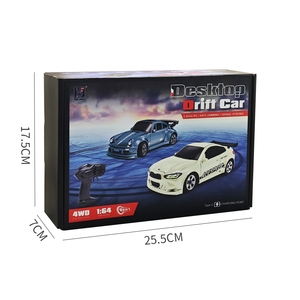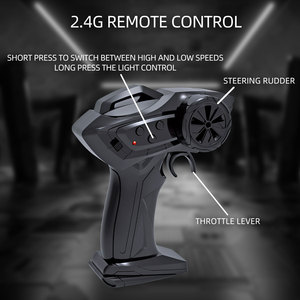(1827 products available)


















































































































































































































1 64 RC toys come in various types, each offering a unique racing experience and level of performance. Here are some common types:
Street Racing RC Toys
These are miniature radio-controlled cars that are built to perform well on paved surfaces. They are fast, with good acceleration and precise steering, allowing them to navigate city streets, parking lots, or other hard surfaces effortlessly. Street racing RC cars are not meant to be driven off-road or on rough terrain.
Drift RC Cars
Drift RC cars are specially designed to slide and maintain control while making sharp turns. They are ideal for drifting on smooth surfaces. These RC drift cars are equipped with rear tires that are slick or made from special compounds that allow for easy sliding.
Buggy RC Cars
Buggy RC cars are versatile. They are a cross between on-road and off-road vehicles, featuring a lightweight chassis and large tires that provide traction on various terrains. Buggies perform well on dirt tracks, gravel roads, and other mixed-terrain environments.
Monster Trucks
Monster truck RC cars are huge with oversized tires. They are designed to conquer rough terrains like rocks, dirt, and gravel. These trucks are powerful and can easily climb obstacles, making them popular for off-road racing and crawling.
Rock Crawlers
RC rock crawlers are built for slow, technical climbing over very rocky and uneven surfaces. They focus on torque, traction, and crawling ability rather than speed. Rock crawlers have detailed suspension systems that allow them to maintain traction on steep inclines and obstacles.
Truggy RC Cars
The truggy RC car is a hybrid between buggies and monster trucks. It combines the best features of both for an all-terrain racing experience. Truggy RC cars have a longer wheelbase and larger tires than typical buggies, allowing them to handle rough terrains better than buggies while maintaining the monster truck's speed.
When selecting 1 64 RC toys for resale, buyers should consider the material, power source, and brand reputation.
1 64 RC toys are made with high-quality materials, mainly polycarbonate or ABS plastic. Polycarbonate materials are known for their toughness and resistance to impact. They can withstand rough play without breaking or cracking. ABS plastic is known for its sturdiness. It offers better protection against physical damage. RC toys coated with ABS plastic have a smooth surface. The toys are more resistant to chemicals, heat, and impacts. They are less likely to chip or crack under stress.
RC toys are available in different power sources. Most RC cars are powered by rechargeable lithium-ion batteries. Lithium-ion batteries have a higher energy density. They offer longer runtimes on a single charge. The batteries are lightweight and compact, making them ideal for small-sized 1 64 RC cars. Some RC toys use NiMH batteries. They are more environmentally friendly than lithium-ion batteries and easier to recycle. RC toys with NiMH batteries have a longer life cycle. They can last for many charge and discharge cycles without significant deterioration.
Buyers should consider the brand reputation before buying RC toys for 1 64 kids. Well-known brands have a good reputation for making safe and high-quality products. The toys are thoroughly tested to meet strict quality and safety standards. They have features that help prevent accidents, such as sharp edges, small parts, or toxic materials. Read the reviews to see the customers' experiences with the products. Buyers should look for brands with positive feedback about product quality, customer service, and timely delivery.
When it comes to remote control cars for children, safety is a top priority. To ensure that children can play safely with their remote control cars, here are some key features and guidelines:
Sturdy Build
RC cars should be made from durable materials that can withstand crashes and rough play. This helps prevent small parts from breaking off and becoming choking hazards.
Rounded Edges
RC cars should have rounded edges and no sharp corners to reduce the risk of cuts and injuries.
Non-Toxic Materials
The materials used in making the RC cars should be non-toxic to ensure that children are safe from harmful chemicals.
Battery Safety
RC cars should use batteries that are easy to access and have a secure battery compartment to prevent children from touching potentially hazardous components. Additionally, using rechargeable lithium-ion batteries with overcharge and short-circuit protection is safer than disposable batteries.
Age Appropriateness
RC cars should be designed for specific age groups, with clear recommendations from manufacturers. For example, some models are best suited for children under three years of age and those above three.
When it comes to remote control (RC) cars, quality features are important to ensure a good performance, durability, and overall satisfaction. Here are some key quality features to consider:
Build Quality
RC cars should be constructed with high-quality materials such as durable plastics, metal components, and reinforced chassis to ensure they can withstand crashes and rough handling.
Precision Engineering
The components of RC cars should be engineered with precision to guarantee proper alignment, smooth movement, and accurate control for an enhanced driving experience.
Advanced Electronics
RC cars should be equipped with advanced electronics, including high-quality motors, reliable speed controllers, and precise servos for improved performance and responsiveness.
Battery and Power System
The RC cars should have efficient battery systems with long runtimes, quick charging capabilities, and user-friendly connectors for extended periods of enjoyment.
Realistic Performance
RC cars should be able to perform realistically with features such as accurate steering, smooth acceleration, and responsive braking to mimic real vehicle dynamics.
What are the dimensions of 1:64 RC toys?
The dimensions of 1:64 RC toys vary depending on the actual model. However, they are approximately 3 inches wide and 6 inches long.
How long do 1:64 RC toys take to charge?
1:64 RC toys take approximately 30 minutes to charge.
How long do 1:64 RC toys batteries last?
1:64 RC toy batteries last between 60 minutes and four hours, depending on the model.
Do 1:64 RC toys need assembly?
Some 1:64 RC toys may require a small level of assembly, such as attaching accessories or decals. However, the assembly is minimal compared to larger models.